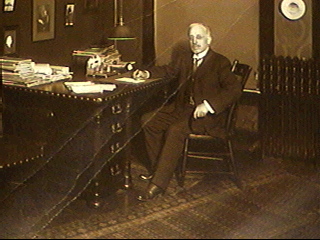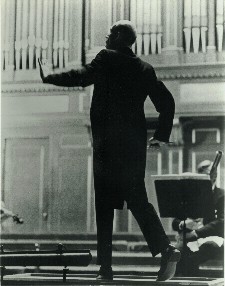



Established June, 1886 in Chicago, Illinois by John
J. Hattstaedt
"American Conservatory of Music, Chicago, Completes Forty-three Years of Service"
Reprinted from the Musical Courier, June 1, 1929

The growth and importance of Chicago as a music center in the past few decades has greatly eclipsed even the most fantastic dreams and broadest predictions of its most sanguine citizens and supporters. The Chicago Civic Opera Company, Ravinia, the Chicago Symphony Orchestra concert season, and the many prominent musical societies are possibly first thought of, but also a most important factor has been the great development of the large musical conservatories of the western metropolis.
No institution of art or learning, without possessing the highest ideals as well as an energetic and practical management, could continue to grow in size and influence over more than four decades as has the American Conservatory of Music, founded in 1886, by its present director, John J. Hattstaedt.
Starting from a most humble beginning, during the first year of its existence with a faculty numbering a mere handful of teachers and its student body, less than one hundred pupils, the school has grown rapidly through the years until now the faculty numbers over one hundred and thirty five artist instructors and the annual enrollment of students is in excess of thirty-seven hundred.
In these days of standardization it is most important to those who are working for degrees and certificates to attend an institution in which they have confidence that the best ideals prevail and that standards are being raised and maintained so that the "piece of parchment" presented at the graduating exercises, certifying to the owner's work, shall receive recognition in all parts of the country and still continue to do so. The brilliant record of the conservatory, whose graduates have been so successful in various fields of musical activity, including professional concert, operatic and dramatic work, teaching, composition, etc., is the best proof of its standards of scholarship.
The faculty of the conservatory is a distinguished one. Among its members are many who have for years given earnest, enthusiastic and devoted service and who are recognized as leaders in the world of music.
Mr. Hattstaedt has for years personally directed the work of the normal departments of the school. His courses of lectures on piano pedagogy, which have included the principles, the psychology, practical education, and all musical and technical problems of the piano teacher, have helped many hundreds of young teachers better to face their life work.
Karleton Hackett, Adolf Weidig and Henlot Levy are associate directors of the conservatory, and Allen Spencer is dean of the faculty. Mr. Spencer, whose personality, remarkable powers as a pianist, and thoroughness as a teacher have made him a leader, has been a member of the faculty since 1892. Mr. Hackett, one of the leading voice teachers in this country for many years, joined the faculty in 1895. His pupils have won renown on the operatic and concert stage, and in addition to his success as a teacher Mr. Hackett is nationally known as a critic and lecturer. Mr. Weidig, head of the department of theory and composition, has had many of his compositions plaued by leading American and European orchestras. He has also received high recognition as guest conductor of the Chicago, Minneapolis and other symphony orchestras. Mr. Levy, who joined the faculty in 1914, has won renown as a concert pianist in Europe and in this country. He is well known as an excellent composer and has trained many brilliant pianists. Kurt Wanieck, a splendid pianist and teacher, joined the faculty in 1906. Louise Robyn, who joined the faculty in 1901, has been uniquely successful in the dual career of teacher of advanced piano students, and for her direction of the children's department and the teachers' training classes.
In the violin department, Herbert Butler and Jacques Gordon may be mentioned for splendid service. Mr. Gordon, an artist of highest distinction, is concertmaster of the Chicago Symphony Orchestra. He is a solo artist of rare ability and is eminent in chamber music. The Gordon String Quartet, which he directs, occupies an important position in the concert activities of Chicago. Herbert Butler, a pupil of Joachim, has concertized with success in America and abroad. A member of the violin faculty since 1902, he has achieved distinction as an artist teacher. As director of the Conservatory Symphony Orchestra, Mr. Butler has built up a strong musical organization, whose concerts in Orchestra Hall each season have been of high merit.
In addition to Mr. Weidig, the department of theory and composition includes such brilliant composers and teachers as Arthur O. Anderson, Leo Sowerby and John Palmer. Wilhelm Middleschülte, of the organ department, a brilliant soloist and composer as well, was for many years organist for the Theodore Thomas and Chicago Symphony Orchestras. O. E. Robinson, a foremost exponent in ideals and modern methods in public school music, has been head of that department since 1901.
The success of the American Conservatory is founded on a faculty of remarkable strength, on courses that meet the requirements of State boards of instruction and national educational bodies, and on its desire to serve sympathetically at all times the needs of its large student body.
At no time during its history has the Conservatory observed so much brilliant native talent or so much keen interest in musical art. Prospects for next season are auspicious of another year of great activity and progress.
Home Page